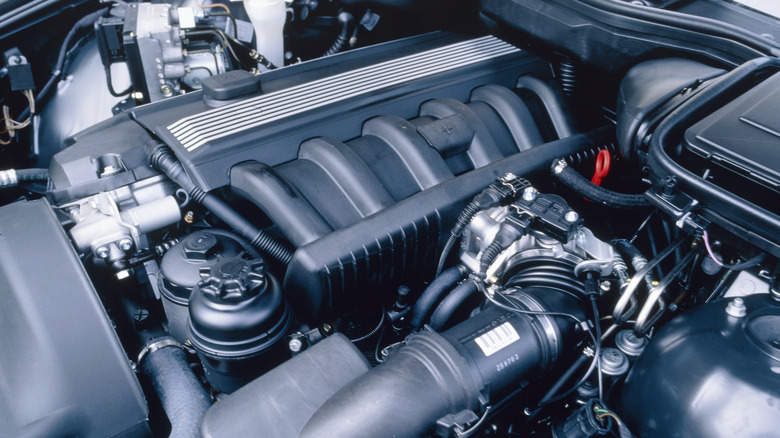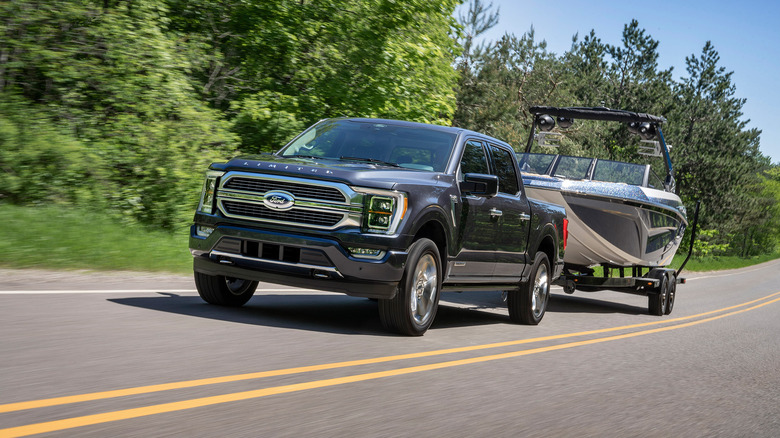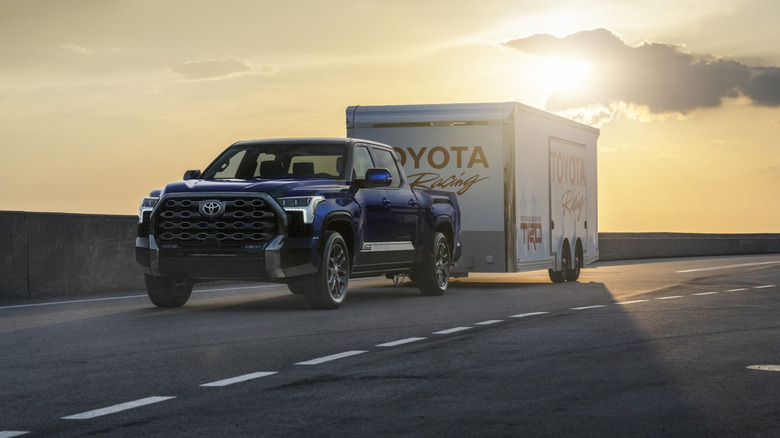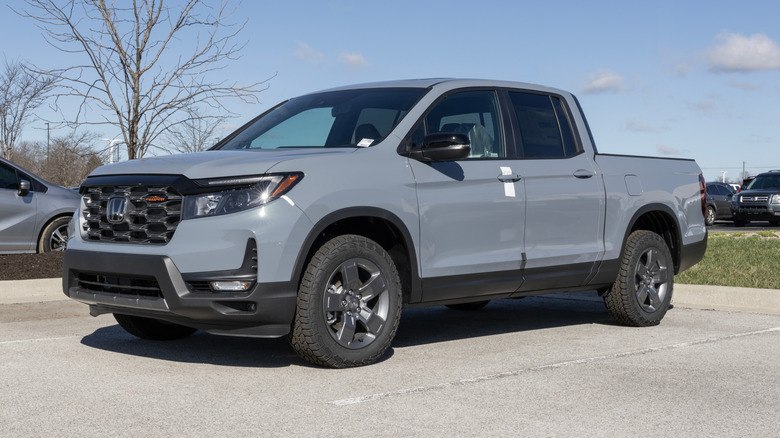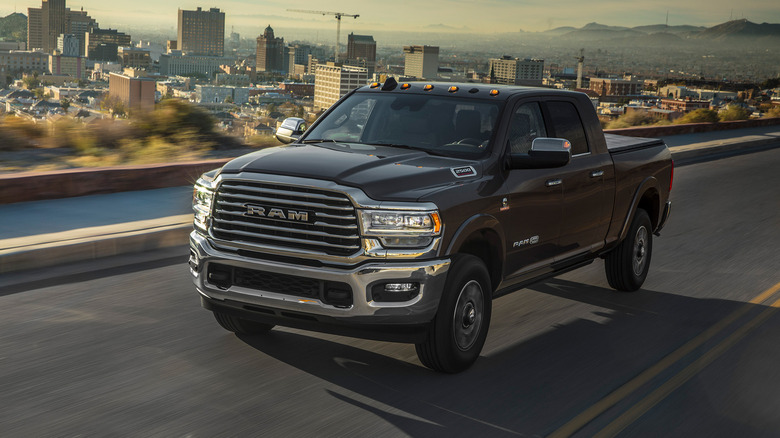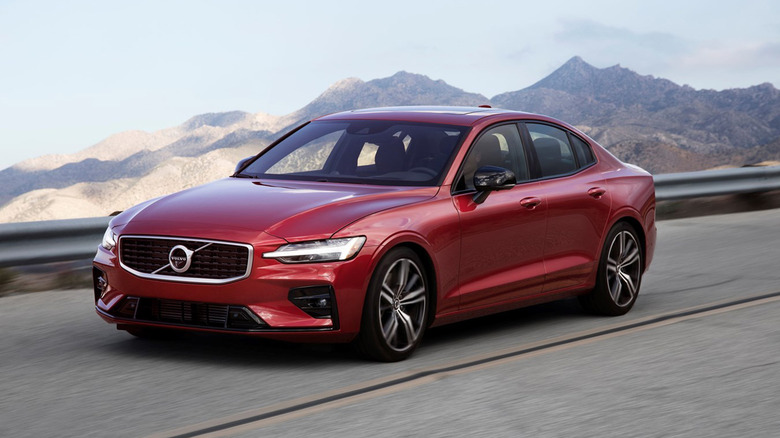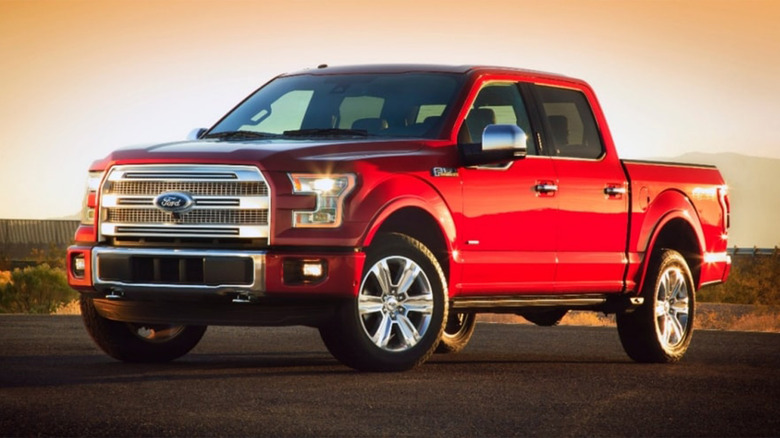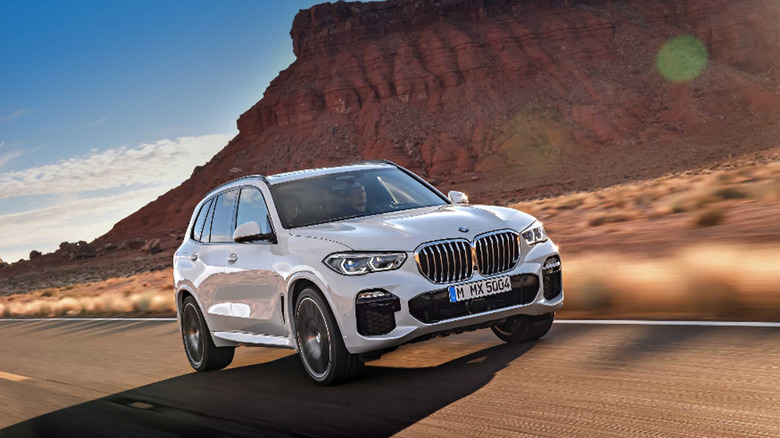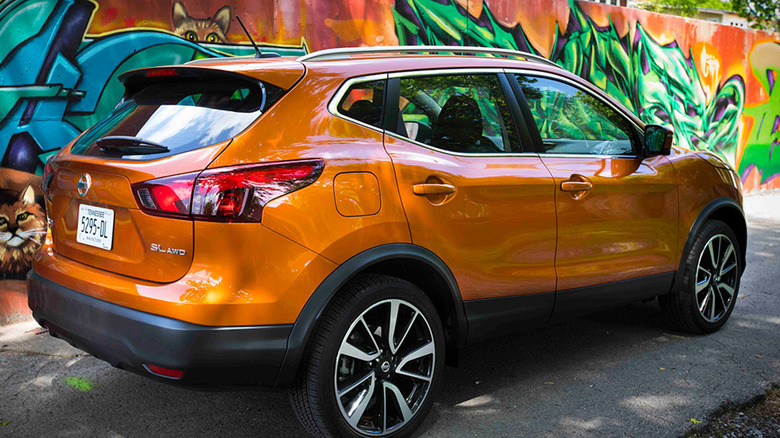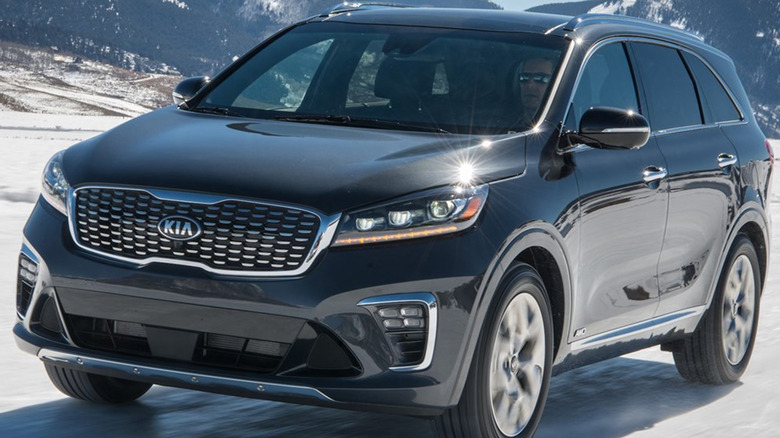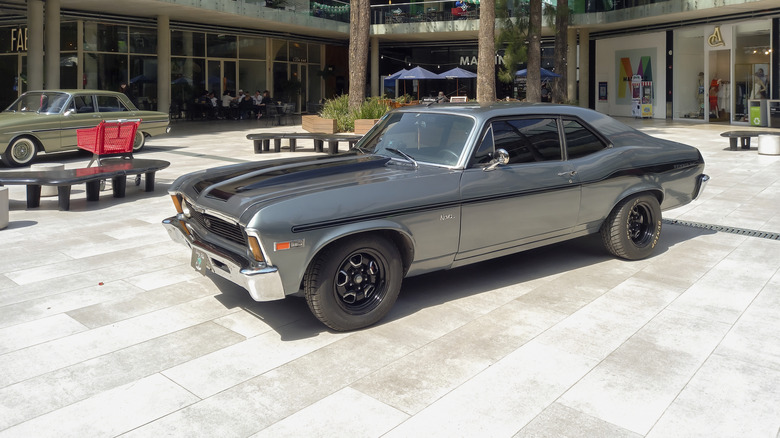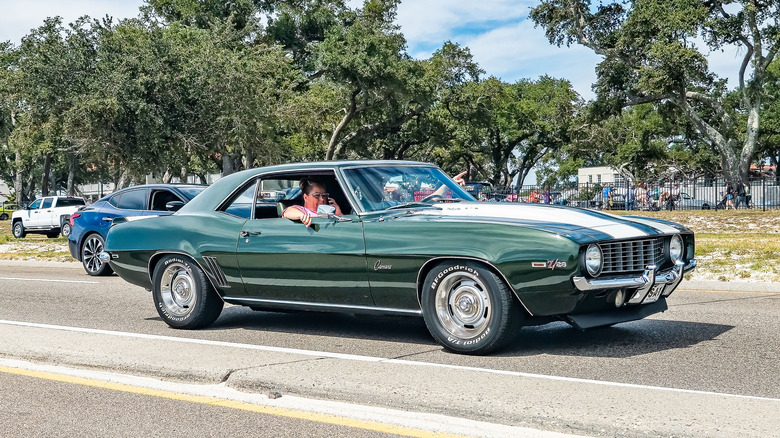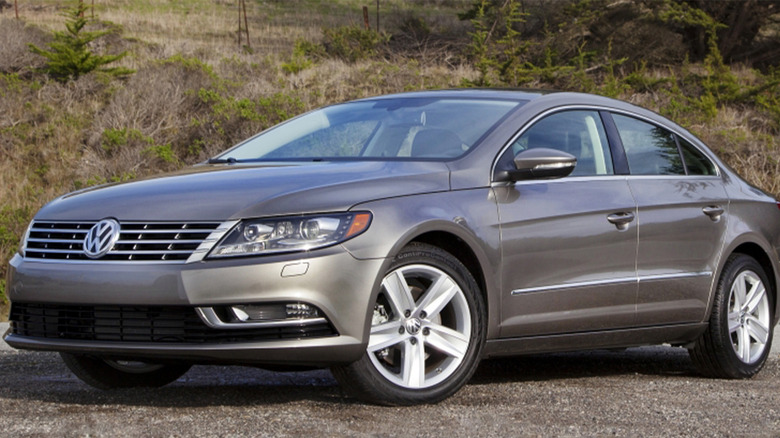The Biggest Engine Recalls In U.S. History
Embarrassing recalls happen to all sorts of tech and other consumer products, including automobiles. Most car models get recalled at least once and for the most part, the repairs are fairly minimal. There have been over 12,000 recalls alone from 2000 through 2022. They occur when a defect is problematic enough to be a safety concern to the U.S. National Highway Traffic Safety Administration (NHTSA). In most cases, vehicle makers issue the recalls on their own with the help of the NHTSA, but sometimes the NHTSA does it on behalf of the automaker.
There have been some huge recalls over the years. One example is the 4.1 million vehicle recall done by Tesla to fix a font size software issue in nearly all of its vehicles, and that wasn't even the most dangerous recall for Tesla. Ford once recalled 17.5 million vehicles for steering wheels that were catching on fire. And the largest recall on record was from parts manufacturer Takata, which had to recall 67 million vehicles across 19 different automakers over an airbag issue that killed dozens of people.
An engine recall usually requires some sort of repair or replacement and since engines are so complex, this can cost automakers a lot of money. In some cases, the fix is simple, such as the 262,000 Mazda cars that just needed a software update. Others require full engine replacements. Engine recalls aren't as common as ones for other parts, but there have been some big ones over the years.
Ford and Lincoln engine recall (90,000 and 125,000 vehicles)
Ford and Lincoln had to recall over 90,000 vehicles for engine issues in the brand's 2.7-liter and 3.0-liter EcoBoost engines. According to the NHTSA, the issue was caused by a manufacturing defect that causes the engine valves to break while the vehicle is in motion, causing power loss that could lead to an accident. Since Ford and Lincoln share a lot of internal parts, the recall affected Lincoln vehicles along with Ford vehicles.
The recall affected 2021 models of the Ford Bronco, Ford F-150, Ford Edge, Ford Explorer, Lincoln Nautilus, and Lincoln Aviator. Owners of those vehicles were directed to dealerships to have tests run on the engine. If the engine was found to be defective, the engine would be replaced free of charge for the customer. The issue was apparently caused by a manufacturing defect that Ford corrected on later versions of the engine.
This isn't the only engine issue Ford vehicles have had in the last few years. In 2023, Ford had to recall 125,322 Ford Escapes, Ford Mavericks, and Lincoln Corsairs due to another engine issue. For that one, engine oil or fuel vapor could find its way to where the ignition sources are located, causing an engine fire when the vehicles were started up again. Either of these recalls could've made it onto this list, so we decided to include both of them.
Toyota and Lexus engine recall (102,000 vehicles)
Long known as one of the industry's most reliable automakers, Toyota has had its fair share of recalls over the years. It's even had to recall some of its engines in the past. In May 2024, 102,000 Toyota and Lexus products had to be recalled due to an engine defect. During production, machining debris wasn't properly cleaned out of some engine blocks. Toyota says that debris can cause knocking, loss of power, or even prevent the vehicle from starting entirely.
The recall affected certain 2022 and 2023 models of the Toyota Tundra and Lexus LX in the gas-powered variants only and specifically only in North America. That helped mitigate the damage, but 102,000 is still a lot of vehicles. Fortunately, Toyota made the recall process simple for consumers. You show up to a dealership and get your engine replaced free of charge. Fortunately, the work doesn't take too long, and Toyota committed to giving owners a loaner car while repairs were being made.
Overall, the recall affected vehicles made between November 2021 and February 2023 and only on 3.4-liter turbocharged V6-equipped vehicles. Aside from this hiccup, the 2021 and 2022 Tundra are otherwise still among the best Tundras ever made, so once Toyota finishes cleaning up the mess, they'll definitely be safe to buy.
Honda engine recall (249,000 vehicles so far)
Honda's placement on this list is unique in that it might change eventually. For now, Honda has voluntarily recalled 249,000 vehicles equipped with the brand's typically excellent 3.5-liter V6 engine. The initial recall affects various Honda and Acura models from 2016-2020, although the list could grow by the time the NHTSA is done investigating.
The issue was with the crankshaft. Per the NHTSA investigation, due to a manufacturing defect that caused some crankshaft pins to be improperly formed, connecting rod bearings could potentially seize up entirely. This could cause massive damage to the engine, and result in engine failure along with engine fire, engine stalling, and decreased engine output, among myriad issues. Honda provided the documents to the NHTSA for its investigation, which is good news because it means the automaker is trying to help.
The problem is that this might end up being a much bigger recall. Another NHTSA investigation, which is still in progress at time of writing, posits that an additional 1.15 million vehicles may be affected by the issue, encompassing all Acura TLX and MDX vehicles along with all Honda Odyssey, Ridgeline, and Pilot vehicles equipped with the 3.5-liter engine over the years from 2016-2020. Basically, this could end up being one of the smaller recalls on the list or one of the largest. Time will tell.
Ram 2500, 3500, 4500, and 5500 recall (306,000 vehicles)
The Ram 2500 and 3500 have one of the largest engine recalls for a single vehicle from an automaker. Over 248,000 Ram 3500s were recalled due to an issue with the 6.7-liter turbo diesel engine from Cummins along with the 68RFE transmission. The affected vehicles were produced from September 2019 to November 2022. Since Stellantis sells a lot of Ram trucks, that means the number is uniquely high. Most recalls of this size involve multiple vehicle families but for Stellantis, it was just Ram trucks.
The issue is technically caused by the transmission, but the engine suffers the consequences. Per the NHTSA, the transmission can overheat, which causes pressure to build. That pressure would expel transmission fluid out of the dipstick tube and onto the engine where it could come into contact with ignition sources and start a fire. The only warning customers got that something was wrong was a malfunction indicator light on the dashboard.
The initial NHTSA reports showed that 199,000 Ram 2500s were affected and the rest were Ram 3500s. However, the recall was eventually extended to over 306,000 vehicles, including the Ram 4500 and 5500 as well. The fix was initially under investigation but was eventually found to be a short circuit in the heater relay grid. The grids were replaced to effectively keep the transmission from splashing fluid on the engine.
Volvo engine fire recall (507,000 vehicles)
Volvo had one of the larger engine recalls in modern history with over half a million total cars recalled in 2019. The recall affected several makes, including 2014-2019 models of the S60, S80, S90, V40, V60, V70, V90, XC60, and XC90 — essentially any car with Volvo's 2-liter, four-cylinder diesel engine. Volvo doesn't sell the diesel engine in the U.S., so American and Canadian buyers were spared the brunt of the recall. That also means there is no NHTSA recall notice for this one.
The cause was a faulty engine part. A plastic piece of the engine intake manifold could melt and deform over time due to temperature changes. This would eventually cause a fire in the engine bay. Volvo told owners that it was safe to keep driving their cars for the time being but to be wary of signs that deformation was happening, including a flashing check engine light and a loss of engine power. However, engine failure occurred without warning in some cases.
Volvo's solution was to essentially leave it alone and deal with it one car at a time. Owners were told that if they didn't have symptoms of the issue then they were fine to drive the car, and Volvo would repair the issue if it ever surfaced.
2014 Ford F-150 recall (552,000 vehicles)
Ford returns to the list with a rather massive engine recall affecting the 2014 F-150 — ones equipped with the 6R80 transmission, specifically. At 552,000 total vehicles recalled, this is the largest example of a single vehicle being recalled for an engine issue we could find. However, Ford sells a boatload of these things every year, so if something goes wrong with a model year, it's going to affect a pretty big number of vehicles.
Much like the Ram issue, this is technically a transmission problem that also happens to affect the engine. The NHTSA says that two components, the powertrain control module and the output shaft speed sensor could lose communication with each other. If such an error occurred, it would cause the truck to shift into first gear no matter how fast it was going. Shifting into first gear at high speed is exceptionally dangerous for the engine and the transmission, and it can cause irreparable damage. It also may cause a loss of control of the vehicle, resulting in an accident and bodily harm.
The fix for Ford was fairly simple. Drivers only had to bring the truck into a dealership and have the powertrain control module recalibrated so that it did not have an error with the other components. The software update for these modules would include an additional check to make sure the OSS signal was accurate, preventing the car from downshifting into first gear suddenly.
BMW N20 engine recall (720,000 vehicles)
BMW had quite the recall in regard to its N20 engines. This was problematic for the brand because it used the N20 in a host of cars for nearly a decade, resulting in nearly three quarters of a million vehicles that needed to be recalled. In total, 14 BMW models from 2012 through 2018 needed to be brought in for service, with the BMW 3 Series leading the pack with 236,000 vehicles recalled over the issue.
The issue stems from an incorrectly installed coolant pump. The connector was in a position where it could be leaked on by the positive crankcase ventilation system. As most people are well aware, when liquid meets electricity, bad things happen and, in this instance, the potential negative side effect was an engine fire. An investigation showed that this happened to many owners prior to the recall. It was also another recall for the N20 engine, the first of which dealt with faulty timing chains.
To fix the issue, BMW inspected affected vehicles to see if the connector was damaged. The whole water pump was replaced if there was damage. After installation of a new water pump, or if the prior water pump was damage free, BMW would install a small shield that kept liquid from getting to the component.
Nissan's defective key recall (800,000 vehicles)
Safety is no laughing matter but if it were, Nissan would arguably have the biggest laugh. The Japanese brand had to recall over 800,000 of its vehicles over one of the goofiest engine-related recalls in recent memory. The recall covered vehicles made from 2014-2020 as well as the Rogue Sport from 2017-2022. Thankfully, no crashes or injuries have been caused by this recall so far.
The issue was, oddly enough, Nissan's car keys. The brand uses a jackknife-style folding key that users would pop out, put in the ignition, and turn it on. In some cases, the key would not stay open, causing the fob to fall toward the driver's knee. If the driver's knee hit it, it could turn the car off mid-use. So, technically, this isn't caused by the engine directly, but much like the Ford and Ram recalls above, the issue affects the engine more than any other system in the car.
Nissan didn't have a fix for this issue initially, but it warned drivers about what could happen and said to replace the key if it breaks. Eventually, Nissan came up with a system where it would install a key blank into the fob to make it less likely for the fob to fail. Nissan also asked drivers not to attach a bunch of accessories to their key chain so it doesn't become too heavy for the mechanism to handle.
Hyundai and Kia's Theta II engine recall (1.6 million vehicles)
The Hyundai and Kia Theta II engine is among the most famous engine recalls in automotive history. It was a well-established disaster for the sister brands that cost them around $210 million in fines and required repairing over a million and a half total vehicles across eight years. The recall affected all 2011-2019 models of the Hyundai Sonata and Santa Fe Sport along with the 2014, 2015, 2018, and 2019 Hyundai Tucson. Kia was hit similarly hard with the 2011-2019 Optima, Sorento, and Sportage affected.
The recall affected all 2.0-liter and 2.4-liter Theta II engines. What happened was the crank milling process produced metallic shavings that could eventually get stuck in the oil channels inside the engine. Restricting the oil caused excess wear on engine components, namely the crank bearings, which would eventually wear out and cause engine failure. In extreme cases, the connecting rod would break entirely and shoot itself through the engine block.
The fallout was disastrous. Multiple lawsuits were filed, and Hyundai was required to give all such vehicles lifetime warranties to fix the issue if it ever surfaced on a customer car.
GM's carburetor recall (4.9 million vehicles)
GM had one of the biggest engine recalls of all time back in the 1960s. It affected a huge number of vehicles, with The New York Times saying that 4.9 million cars were recalled in total. This one didn't get a lot of press outside of the single article from The New York Times, with the only other source of information we could find being an Associated Press article printed in the Winona Daily News from 1969.
According to the news articles, GM had to recall a number of cars, trucks, and buses across its Pontiac, Chevrolet, and GMC brands to fix a carburetor and exhaust issue. The carburetor issue could jam the throttle, causing affected vehicles to accelerate to their maximum speed. Meanwhile, the exhaust issue was causing exhaust to get pumped into the passenger cabin which was responsible for four deaths before a fix was applied.
At the time, it was the largest such recall in history, giving GM a crown that it would retain in just a few short years. This dual recall is also paired with another recall of 1.1 million vehicles due to brake defects that caused a number of crashes.
Chevrolet motor mount recall (6.68 million vehicles)
Two years after setting the record for the largest recall in history, GM again took the crown with a recall that affected 6.68 million vehicles in total. This far less serious recall affected all 1965-1970 full-size Chevy cars, 1965-1969 Chevy II's and Novas, 1967-1969 Camaros, and 1965-1970 Chevy and GM light trucks. Chevy and GMC were selling exceptionally well in the 1960s, so a lot of folks needed repairs.
The defect this time was in the motor mount, which could break on the left side, causing the engine to rise up. That rise would cause the accelerator linkage to open, which made the engine rise up even more. It also stretched other components, making the car much more difficult to stop. The defect would mess up the transmission, making it so the car didn't have a park and had to be started in reverse.
According to the NHTSA, the issue caused dozens of accidents and injuries, prompting an investigation that lasted a couple of years before the recall was finalized in 1971. Chevy never fixed the mounts, instead opting to put in a bracket to prevent engine rise in the event the mount broke.
Volkwagen diesel engine recall (11 million vehicles)
Volkswagen is the current record holder for the largest engine-specific recall at approximately 11 million total vehicles. This one is commonly referred to as Dieselgate and affected a vast number of vehicles, including the Beetle, Golf, Jetta, Passat, and Touareg, along with the SportWagen models of the Jetta and Golf. Audi vehicles impacted included the A3, A6, A7, A8 (and A8L), Q5, and Q7. In addition, the Porsche Cayenne was also impacted. Impacted vehicles were made between 2009 and 2016 when the recall was issued.
Technically, the engines themselves were fine but the software running them had been rigged and allowed the cars to cheat emissions testing. The software would recognize when the car was being tested and re-tune itself to fake its results and then return to a less emissions-friendly state later. This is against the law and the recall forced Volkswagen to fix the software and also replace the injectors and catalyzers to bring the cars within emissions standards.
The impact was quite large, costing Volkswagen well over $10 billion to fix, and forcing it to buy back its diesel engines from U.S. consumers while also paying out a settlement. The company hasn't sold another diesel car in the U.S. since.
